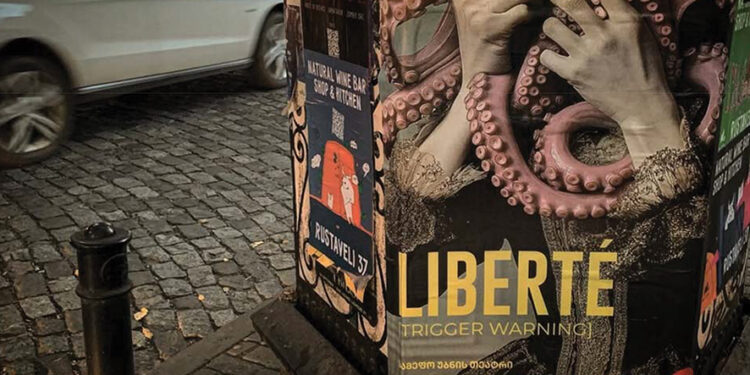In May 2025, a theatrical production titled Liberté by the Royal District Theater in Tbilisi ignited a fervent cultural and religious debate in Georgia. Drawing from Marquis de Sade’s Philosophy in the Bedroom, the play delved into themes of sexuality, including same-sex relationships, and featured dialogues perceived as blasphemous. Despite restrictions on recording, excerpts were leaked and broadcasted by the pro-government channel Imedi, which accused the production of promoting “LGBT propaganda” and insulting religious sentiments.
The Georgian Orthodox Church responded by condemning the play as “blasphemous” and threatened excommunication for its creators unless they repented. Protests ensued outside the theater, with demonstrators demanding apologies from director Data Tavadze and his father, actor Nika Tavadze, as well as the cessation of municipal funding for the theater. The elder Tavadze dismissed the uproar as “talentless propaganda.”
The Liberté controversy encapsulates the ongoing struggle within Georgian society to balance respect for religious traditions with the embrace of artistic freedom and progressive values
This incident is not isolated in Georgia’s history. In 2006, the Georgian Orthodox Church urged believers to avoid watching The Da Vinci Code, labeling it as humiliating to Christian feelings. Protests erupted outside cinemas in Tbilisi, with banners proclaiming, “watching this film means crucifying Christ a second time.” Similarly, the 2019 film And Then We Danced, which portrayed a same-sex romance within the Georgian National Ballet, faced threats from ultra-conservative groups. Leaders like Levan Vasadze and Dimitri Lortkipanidze announced plans to picket cinemas, accusing the film of opposing Georgian and Christian traditions. These events underscore a recurring tension between artistic freedom and religious conservatism in Georgia.
The Georgian Orthodox Church holds significant influence over the nation’s cultural and political spheres. Its opposition to events like Tbilisi Pride Week reflects a broader resistance to Western liberal values. In 2024, the Church called for legislative action against what it termed “a perverse lifestyle,” emphasizing the need to protect the country’s Christian heritage. This intertwining of religious authority and national identity often positions the Church as a gatekeeper of cultural norms, challenging progressive movements and expressions that diverge from traditional values.
Theater in Georgia has long been a medium for political and social commentary. Sandro Akhmeteli, a prominent Georgian theater director in the early 20th century, used his platform to challenge authoritarianism. His play In Tyrannos (Against Tyranny) became a symbol of resistance during the 2024-2025 protests against anti-democratic actions in Georgia. The play’s banner was displayed in front of the Rustaveli Theater, echoing Akhmeteli’s defiance against Soviet repression. This historical context highlights the enduring power of theater as a form of dissent and the risks artists face when confronting prevailing power structures.
When Art and Faith Collide: A Global Perspective
The Liberté controversy encapsulates the ongoing struggle within Georgian society to balance respect for religious traditions with the embrace of artistic freedom and progressive values. As Georgia continues to navigate its identity in the modern world, the dialogue between sacred beliefs and secular expressions remains a defining aspect of its cultural landscape. Understanding this dynamic is crucial for appreciating the complexities of Georgian society and the challenges it faces in reconciling its rich heritage with contemporary global influences.
The conflict between religion and secular art has sparked intense debate across the globe, often putting freedom of expression at odds with religious sentiments. As societies evolve and grapple with questions of modernity, tradition, and identity, these clashes reveal the complex relationship between cultural production and religious beliefs. Examining recent controversies from various countries can shed light on how these tensions are managed, and whether coexistence is feasible in a pluralistic world.
In France, the concept of laïcité (secularism) is deeply entrenched in the state’s identity, often placing art at odds with religious conservatism. In 2011, Golgota Picnic, a provocative play by Argentine director Rodrigo García, sparked outrage among Catholic groups for its explicit content and its perceived mockery of Christian symbols. Performances were met with protests, prayer vigils, and even threats, prompting increased security at theaters. However, the French government firmly defended the play under the principle of artistic freedom. The Ministry of Culture emphasized that, while the content could be seen as controversial, the state would not yield to censorship based on religious pressure. This stance underscored France’s commitment to maintaining a clear separation between church and state, even when faced with public outcry.
As Georgia continues to navigate its identity in the modern world, the dialogue between sacred beliefs and secular expressions remains a defining aspect of its cultural landscape
In 2015, Russia witnessed a high-profile clash between religious and artistic communities with the staging of Richard Wagner’s opera Tannhäuser at the Novosibirsk Opera and Ballet Theater. The production, directed by Timofey Kulyabin, reimagined the medieval knight as a filmmaker producing a controversial film about Jesus. Orthodox activists accused the director of blasphemy, sparking mass protests. The Russian Orthodox Church, bolstered by the state’s conservative turn, called for Kulyabin’s prosecution. The director was charged under the country’s anti-blasphemy law, introduced in 2013 after the infamous Pussy Riot trial. Despite public support from artistic communities, the theater’s director was dismissed, and the production was canceled. This incident highlighted the state’s willingness to enforce religious sentiments through legal means, curbing artistic expression to align with dominant Orthodox values.
In India, where religion permeates public life, cinema has often been a flashpoint for controversy. The 2018 Bollywood film Padmaavat, directed by Sanjay Leela Bhansali, faced violent protests from right-wing Hindu groups, who claimed that the film distorted historical facts and disrespected the legendary queen Padmavati. Rajput groups, in particular, took offense at rumors of a dream sequence depicting a romantic scene between the queen and a Muslim ruler. Despite the Indian Supreme Court’s ruling allowing the film’s release, several states imposed local bans, arguing that public safety was at risk. Violent protests continued, with attacks on cinemas and threats to the actors. Eventually, the central government intervened, emphasizing the importance of both artistic freedom and public order. The film’s eventual success at the box office signaled a victory for creative liberty, though the compromise of local bans revealed the persistent power of religious mobilization.
Satire and religion have a contentious history in the United States, but the Broadway musical The Book of Mormon by Trey Parker, Matt Stone, and Robert Lopez broke new ground in 2011. The irreverent portrayal of Mormon missionaries provoked some criticism from religious communities, but was largely celebrated for its bold humor and critique of organized religion. The Church of Jesus Christ of Latter-day Saints, rather than condemning the play, responded strategically. Instead of protesting, they purchased ad space in playbills, inviting audiences to learn more about the real beliefs of Mormons. This adaptive approach not only defused potential backlash but also demonstrated a pragmatic embrace of dialogue over confrontation.
Music, like theater, often becomes a battleground for cultural and religious ideals. Nigerian artist Falz faced harsh criticism from Muslim groups over his 2018 song This Is Nigeria, which tackled corruption, social issues, and religious hypocrisy. A segment of the video depicted women in hijabs dancing, which some Islamic organizations called blasphemous. The Nigerian Islamic group MURIC demanded that Falz withdraw the video and apologize, threatening legal action. However, Falz refused, defending his work as social commentary. The controversy prompted national debates on artistic responsibility and freedom, with many artists rallying behind Falz. No legal action was taken, marking a tentative victory for free expression in a country where both secular and religious values coexist uneasily.
Across these examples, responses to religious-artistic conflict vary widely, reflecting each nation’s sociopolitical context. France’s strict secularism stands in stark contrast to Russia’s intertwining of Orthodoxy and state ideology. India’s regional political pressures often overshadow national legal principles, while the US shows a capacity for satire to coexist with faith when handled with a touch of irony. In Nigeria, music serves as a critical lens on societal issues, albeit under constant scrutiny from conservative groups. What unites these cases is the enduring challenge of accommodating both artistic freedom and religious beliefs. The way forward seems less about finding a universal solution and more about understanding the local dynamics that shape each conflict. By fostering open dialogues rather than imposing strict verdicts, societies can better navigate these complex intersections of art, belief, and public life.
By Ivan Nechaev














